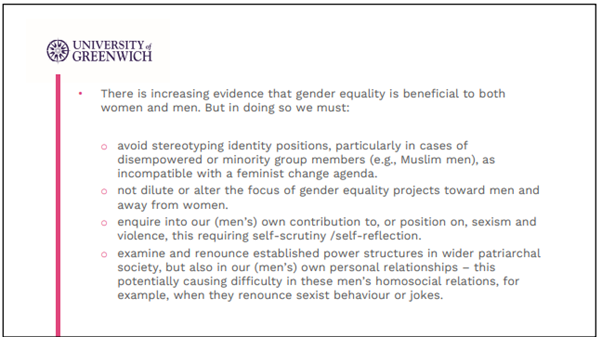Professor Russell Luyt makes the case in support of men as change agents for gender equality. Watch the video and access our resources from the third event in our Gender Based Violence series.
In this session Professor Russell Luyt made the case in support of men contributing as, or allied to, change agents for gender equality. This task is not without difficulty. It is one in which a balance between competing demands must be found: refraining from reproducing normative masculinity in these men’s work while at the same time motivating them; balancing a focus on men and women in their work, in order to not marginalise or even undermine women’s projects and their funding; as well as these men undergoing (potentially painful) self-reflection concerning their own and personal gender and sexuality politics and experiences whilst fostering their continued engagement. There are many examples of men’s involvement in gender equality work globally – for example, prevention of men’s violence against women and gender equality intervention programmes. Their success is often mixed and reflects some of the difficulties noted above. And yet the need for men’s pro-feminist engagement remains undiminished.
Engaging Men as Agents of Change Toward Gender Equality
Professor Russell Luyt discussed engaging men as agents of change toward gender equality in our series of events covering the many and varied aspects and causes of Gender Based Violence.
Access the Presentation
The slides from the presentation are available in PDF Format here.
How men can help
In this episode of the Healthy for Men Podcast, Professor Russell Luyt takes part in an honest discussion about the responsibility on men when it comes to the unacceptable abuse suffered by women.

Russell’s top tips for men in becoming visible allies for women include:
- Be willing to call out negative behaviour among other men
- Participate in allyship to women’s initiatives
- Look critically, on an ongoing basis, at their own behaviour and the impact it may be having on others, especially women and other marginalised groups
The Metropolitan Police have also provided these useful tips for helping other people feel safer on the streets.
About the Speaker
Professor Russell Luyt is the Head of our School of Human Sciences. As a lecturer, his specialisms include social psychology, qualitative methods, and the psychology of gender. He is currently supervising a number of doctoral students in research broadly relating to gender, sexualities and prejudice.
About the Series
The Women's Network are holding a series of events in response to the reaction to Sarah Everard’s murder and the subsequent response to the vigil held in honour of Sarah and other victims of male violence. We want the voices of all women to be heard; intersectionality is woven into our network. If you would like to get involved, please do so via the Women's Network webpage, you can either Join our Team or Contact Us from the home page.